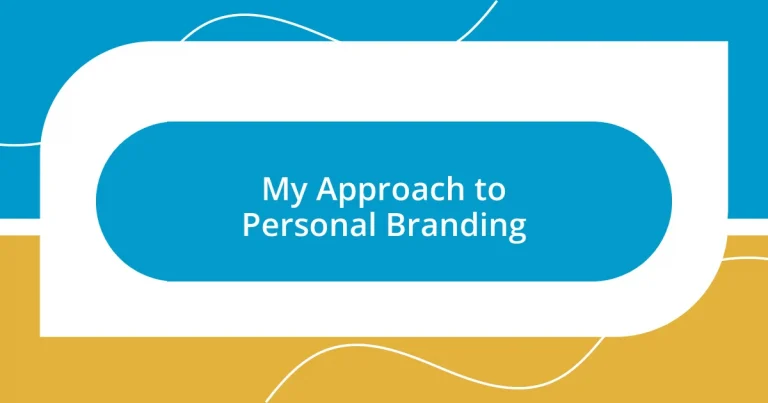Key takeaways:
- Understanding personal branding involves owning your narrative, focusing on authenticity, and forging deeper connections through shared experiences.
- Building your personal brand requires clarity on your values, consistency in your presence, and embracing vulnerability to foster genuine engagement.
- Measuring brand success can be achieved through tangible metrics, audience feedback, and social media analytics to refine and enhance your impact.
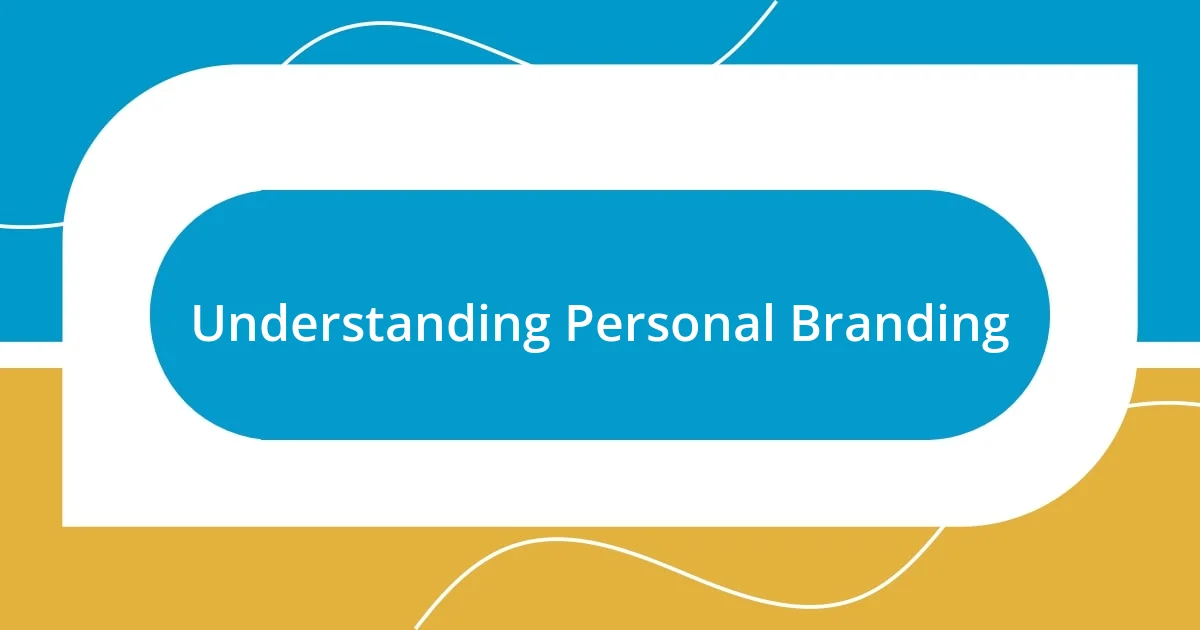
Understanding Personal Branding
Personal branding is much more than just a marketing buzzword; it’s about how you present yourself to the world. I remember a time when I felt completely lost in my professional journey. I hadn’t considered how my interests and values shaped my personal narrative. That personal branding lightbulb moment came when I realized that my experiences didn’t just define me professionally; they were a rich tapestry that could connect me to others.
Think about it: how do you want people to perceive you? When I began deliberately shaping my personal brand, I noticed a change in how others engaged with me. I started to focus on authenticity—sharing my true self, including my quirky interests and the challenges I’ve faced. This not only made me more relatable but it also created deeper connections. Have you ever considered how your unique story could be a powerful tool for engagement?
In essence, personal branding is about control—taking the reins on your narrative rather than letting others define it for you. I’ve seen how powerful it can be to share my journey, warts and all. It’s not just a self-promotional tactic; it’s an invitation for others to share in your experiences and, hopefully, find common ground. By owning my story, I’ve found opportunities that resonate with my identity, making both my work and my relationships richly rewarding.

Building Your Personal Brand
Building your personal brand involves more than just putting on a façade; it’s about finding clarity in who you are and what you stand for. I often remind myself of the time I decided to share more of my journey on social media, not only to express my ideas but to connect with people who resonated with them. This authenticity sparked meaningful conversations and helped me attract opportunities I never imagined would come my way.
To effectively build your personal brand, consider the following:
- Identify Your Values: Reflect on what truly matters to you. I found that my commitment to lifelong learning defined much of my personal narrative.
- Show Consistency: Whether it’s your online presence or how you interact in person, consistency matters. I learned that building trust requires being the same person across platforms.
- Engage with Your Audience: Create conversations rather than monologues. When I actively listened to feedback, I cultivated a community that felt invested in my journey.
- Embrace Vulnerability: Sharing challenges alongside successes makes you relatable. I’ve realized that discussing setbacks often brought more encouragement than triumphs.
- Be Authentic: People are drawn to genuine stories. When I integrated my love for cooking into my brand, it opened up fun collaborations that showcased my personality.
Building your personal brand takes time, reflection, and a willingness to step out of your comfort zone, but the rewards are genuinely enriching.
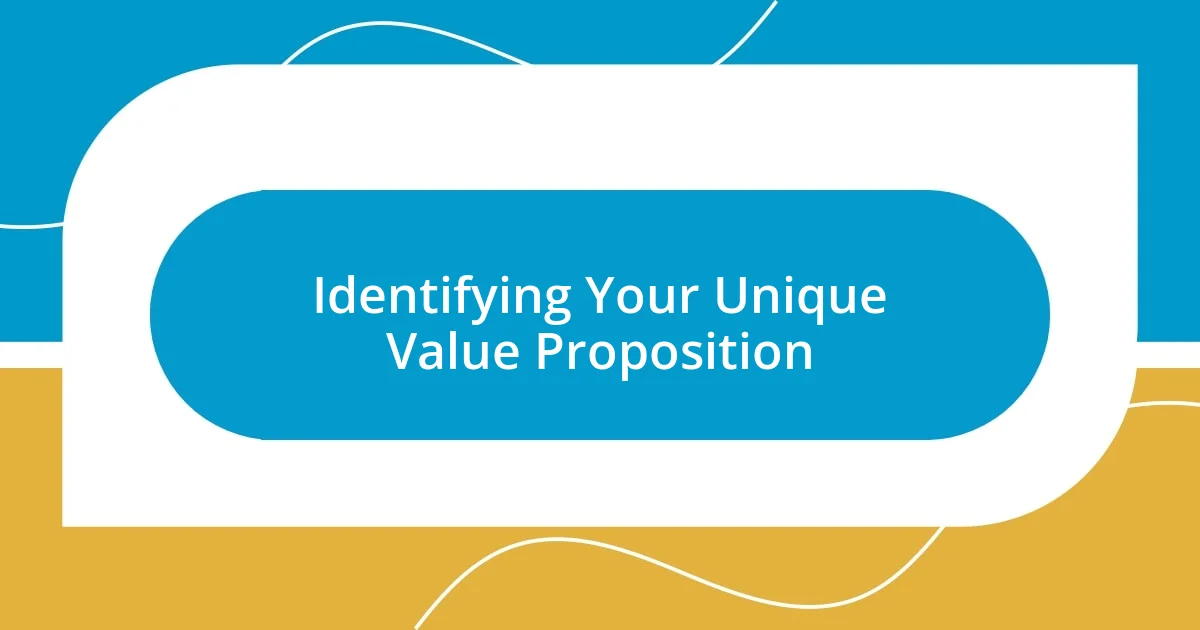
Identifying Your Unique Value Proposition
Identifying your unique value proposition is a critical step in establishing your personal brand. I can recall the moment I understood that my passion for storytelling could be my distinct edge. Exploring how my life experiences, combined with my skills, shaped what I had to offer helped me articulate my value to others. It often sparks a sense of excitement realizing that this blend makes me not just another face in the crowd but a unique voice with something meaningful to share.
To truly pinpoint your unique value, I suggest conducting a self-assessment. Write down your strengths, passions, and experiences in a list. I did this exercise, and it was an eye-opener; I discovered overlaps between my love for technology and my knack for simplifying complex concepts. This revelation guided me toward roles that aligned with my strengths and allowed me to help others navigate through challenges. Asking friends for feedback can also provide insights you might have overlooked, enriching your understanding of how others perceive your value.
Ultimately, your unique value proposition is like a personal compass. It helps you navigate decisions about your personal brand and career path. I often reflect on my journey and the moments when my proposition resonated most, like when I gave a workshop that combined my technical skills and storytelling. The feedback was overwhelming and reinforced that my personal blend of talents offers something distinct. Have you ever experienced that spark when your unique skills and life experiences truly shine?
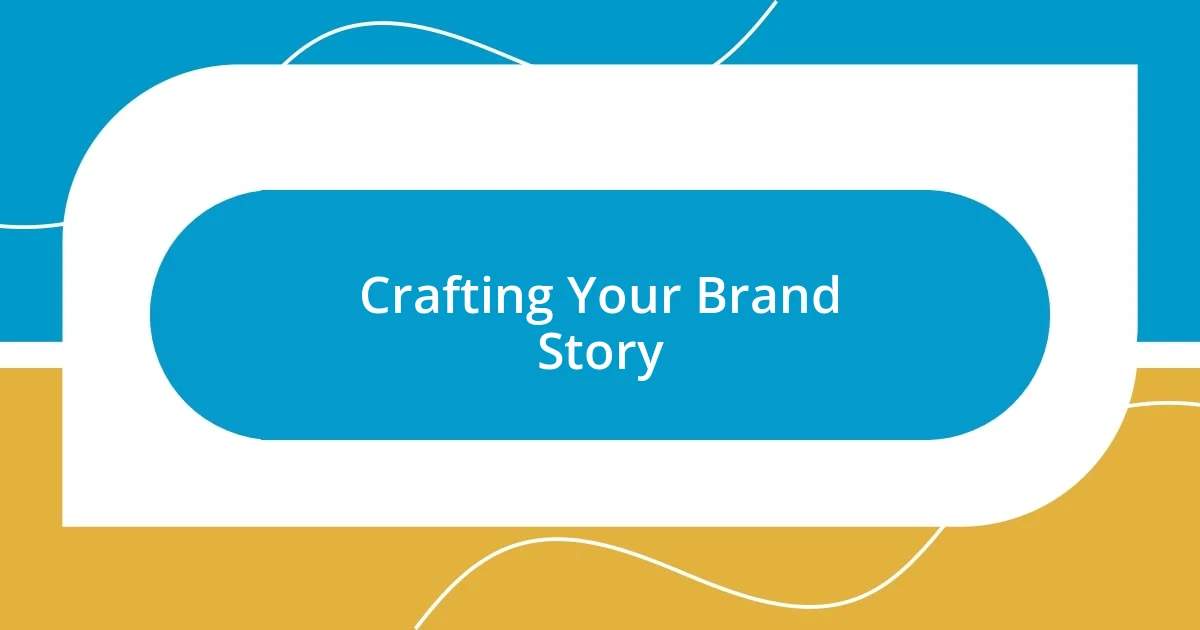
Crafting Your Brand Story
Crafting your brand story isn’t just about listing achievements; it’s about weaving a narrative that reflects who you are at your core. I remember sitting down one evening, coffee in hand, and mapping out the moments that shaped my journey. Each memory, whether a success or a failure, added texture to the story I wanted to tell. Can you recall the pivotal moments that define your own path?
Your experiences are the threads that create a rich tapestry of your identity. I often share how a challenging job transition turned into an unexpected opportunity for growth. It made me realize that vulnerability in my narrative attracts connections. When I began to open up about my doubts and fears, people responded with their stories, too. This mutual sharing built a community around our collective experiences.
Don’t be afraid to put your emotions on display. In my case, letting my passion for creative writing spill into my personal brand made a significant impact. It’s not just about the facts; it’s about how those facts made me feel and how they shape the person I am today. So, ask yourself—how does your story resonate with the values you wish to convey? Let your genuine self be the guiding force in crafting your brand narrative, making it resonate with others authentically.
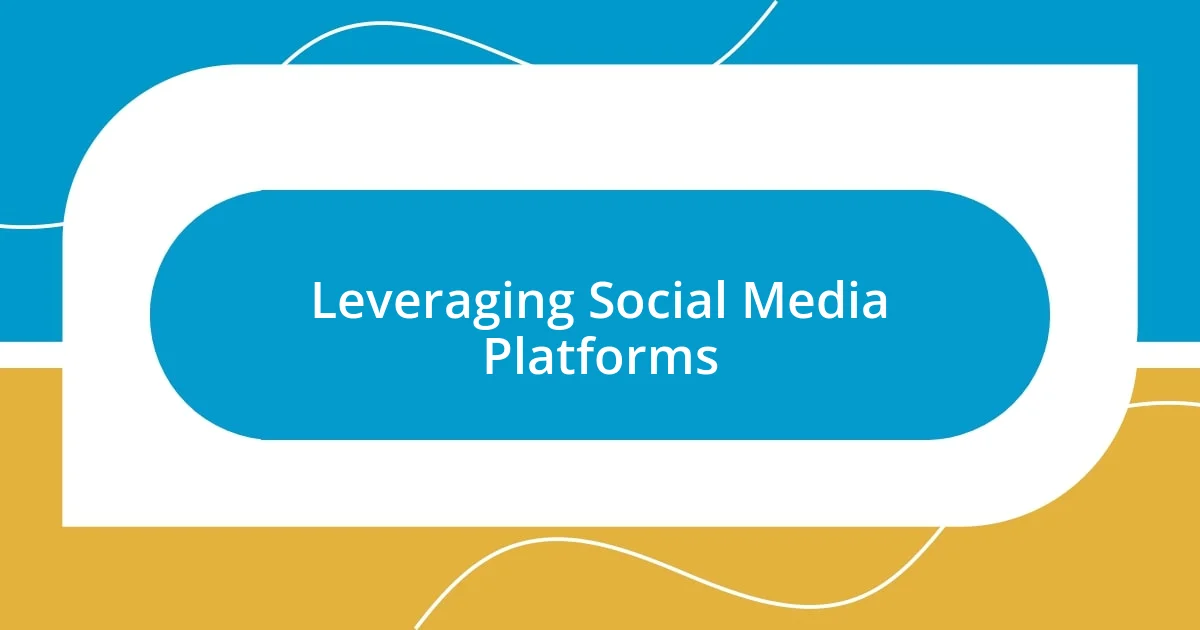
Leveraging Social Media Platforms
Social media platforms are an incredible way to amplify your personal brand. When I first dove into platforms like LinkedIn and Instagram, I was a bit hesitant about sharing my unique perspective. Yet, I found that my posts about my journey resonated with others, inviting genuine engagement. Have you ever realized how a single post can ignite a discussion? It’s a powerful reminder of the connections waiting to be made.
The beauty of social media lies in its versatility; you can use different formats to showcase your brand. I remember posting a short video where I unpacked a complex topic I was passionate about. Instead of just written content, providing a visual and personal touch allowed my audience to see me as relatable and approachable. This authentic approach not only differentiated me but also fostered trust. What creative ways can you think of to convey your message?
Engagement is key on these platforms. I learned early on that responding to comments can foster community, making others feel valued. When someone shared their experience on my post about overcoming obstacles, my heartfelt response sparked a deeper conversation and made them feel heard. It’s moments like these that remind me—what you share goes beyond information; it’s about building relationships and inviting dialogue. How can you leverage your social media presence to connect with others more meaningfully?
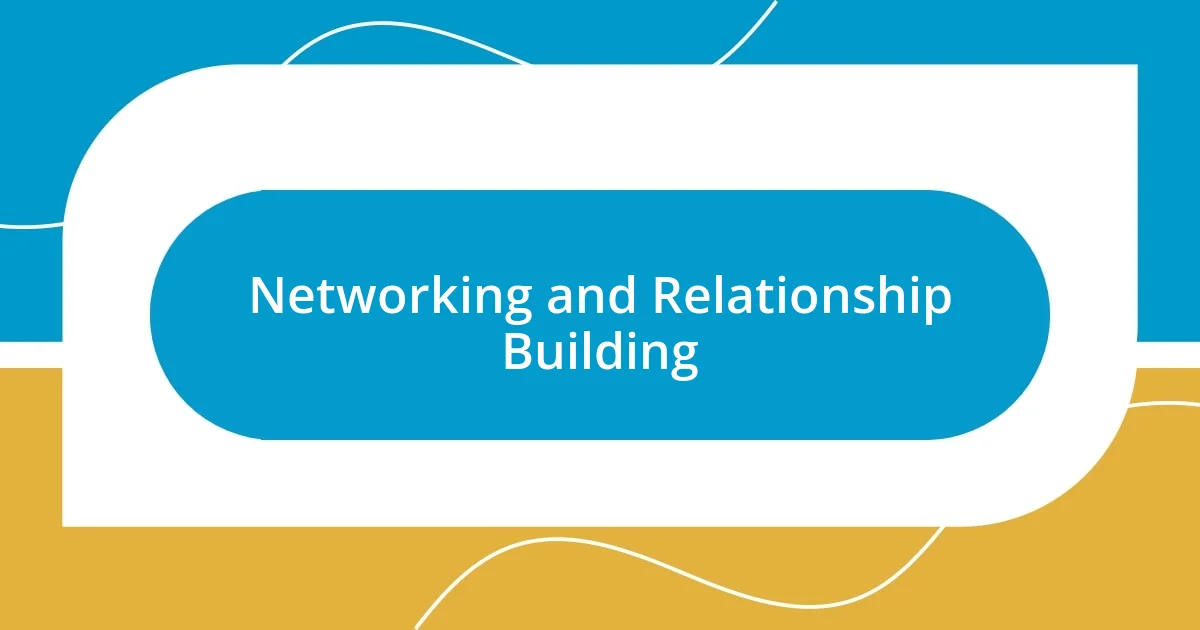
Networking and Relationship Building
Networking is about more than just exchanging business cards; it’s about creating genuine connections. I recall attending a small industry conference where I met a fellow LinkedIn user. Instead of a formal introduction, we engaged in a casual conversation that unfolded our shared interests and aspirations. That day, I realized that relationships often start in the most unexpected moments, so why not be open to those interactions?
Building relationships takes time and effort, especially if you want them to be meaningful. I once spent an afternoon volunteering at a local charity event, and the connections I made were both personal and professional. Sharing that experience over a casual lunch with fellow volunteers enriched our bond. Have you thought about how shared experiences can forge stronger relationships? It’s a powerful reminder that authentic connections often stem from shared values and efforts.
One key aspect of effective networking is the follow-up. I tend to write a brief message after meeting someone new, reminiscing about our conversation. This small gesture not only keeps our connection alive, but it also makes the other person feel valued. It’s interesting how many people don’t take this simple extra step. Isn’t it worth the effort to turn a fleeting introduction into a lasting relationship? Each connection can open doors to opportunities we may not even be aware of yet.
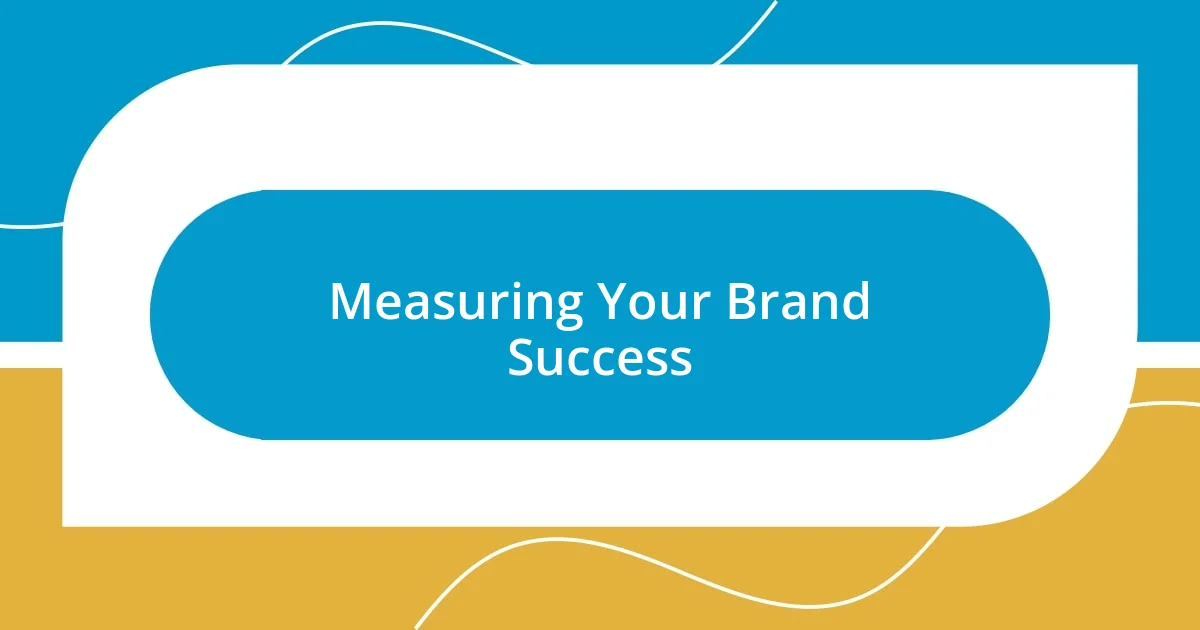
Measuring Your Brand Success
Measuring the success of your personal brand can sometimes feel daunting, but I’ve found that breaking it down into tangible metrics helps. For instance, after launching my own brand, I started tracking engagement rates on my posts. When I noticed a spike in likes and comments after sharing a personal story, it was clear that authenticity resonates with my audience. Have you considered what metrics tell you the most about your impact?
I also rely on feedback from peers and mentors to gauge my branding effectiveness. There was a time when I received a thoughtful comment from a colleague who said my content inspired them to pursue a project they were hesitant about. That moment was enlightening; it made me realize the influence my brand had on others. How do you collect feedback to refine your brand?
Social media analytics provide another layer of insight. I remember feeling exhilarated when I accessed insights that showed an increase in follower demographics aligning with my target audience. It reinforced that my content wasn’t just reaching anyone; it was engaging the right people. How do you analyze your audience to ensure that your branding efforts are hitting the mark?












